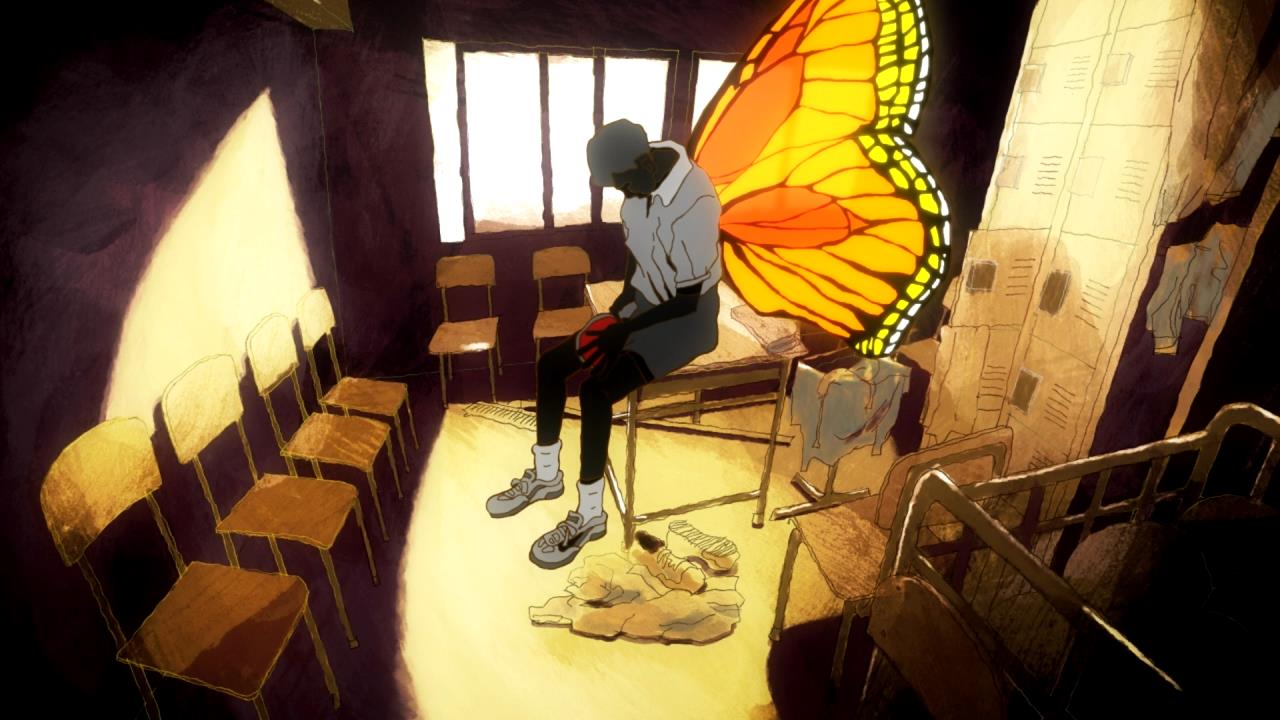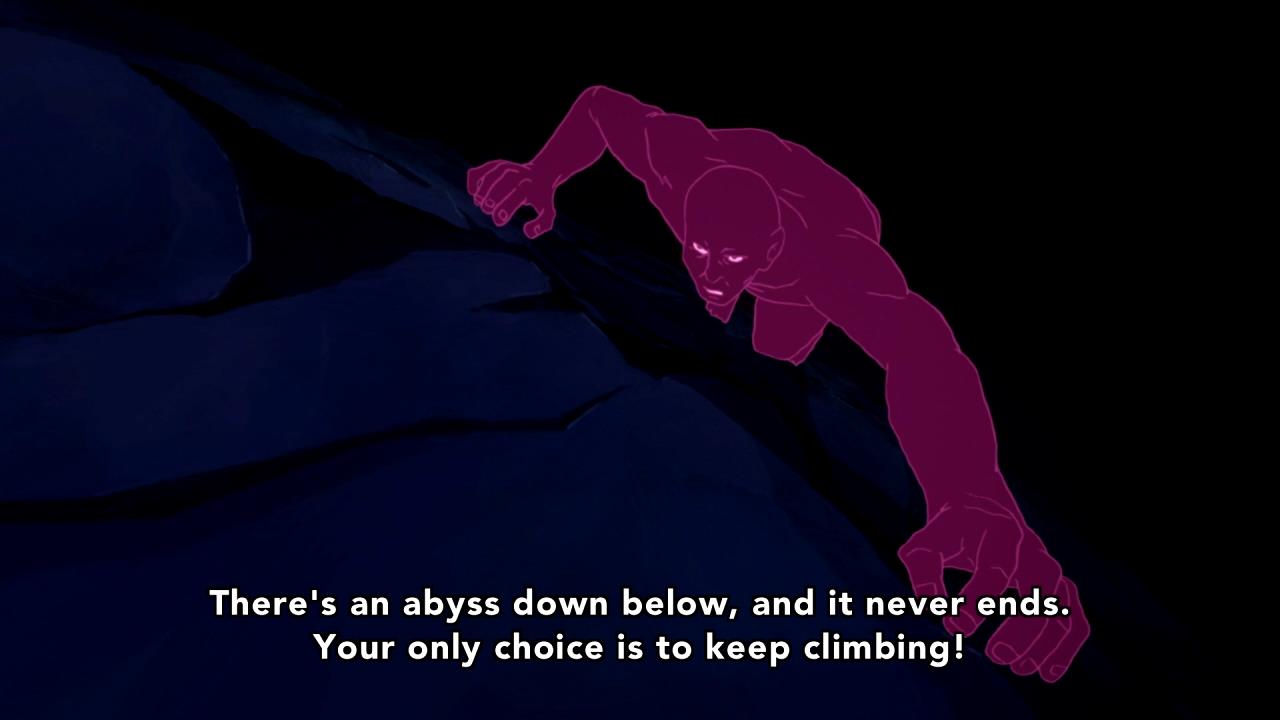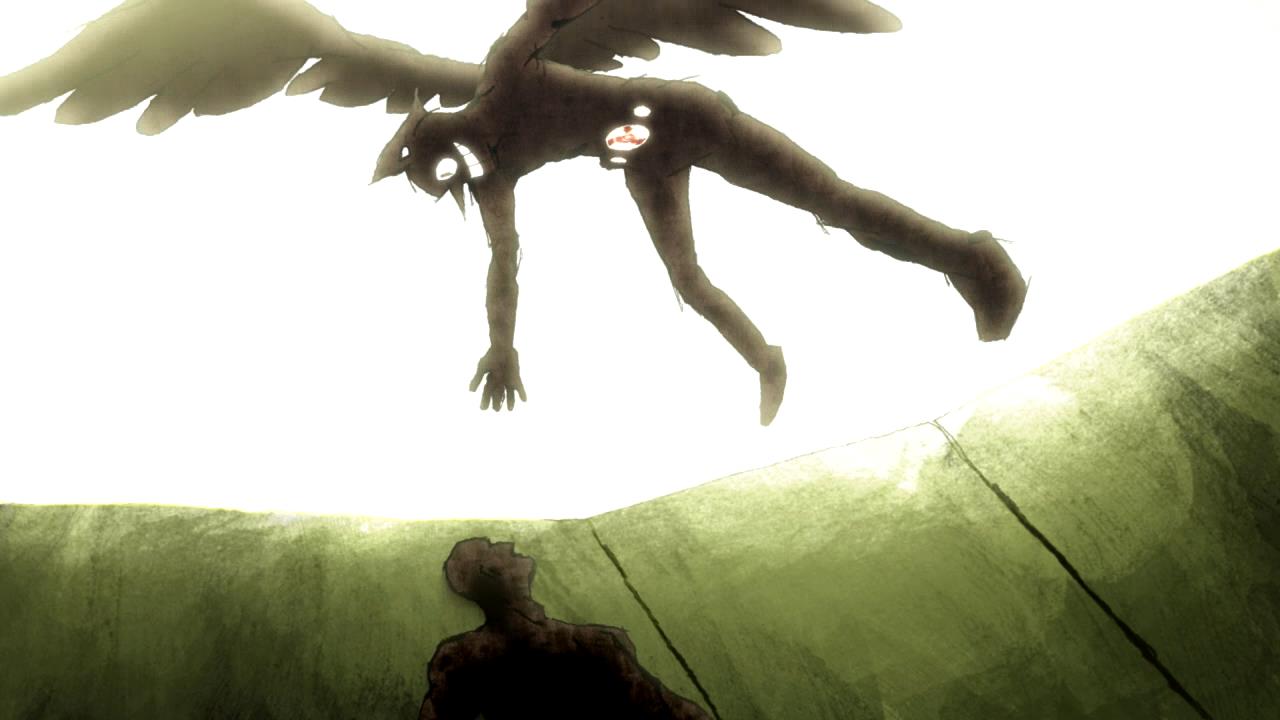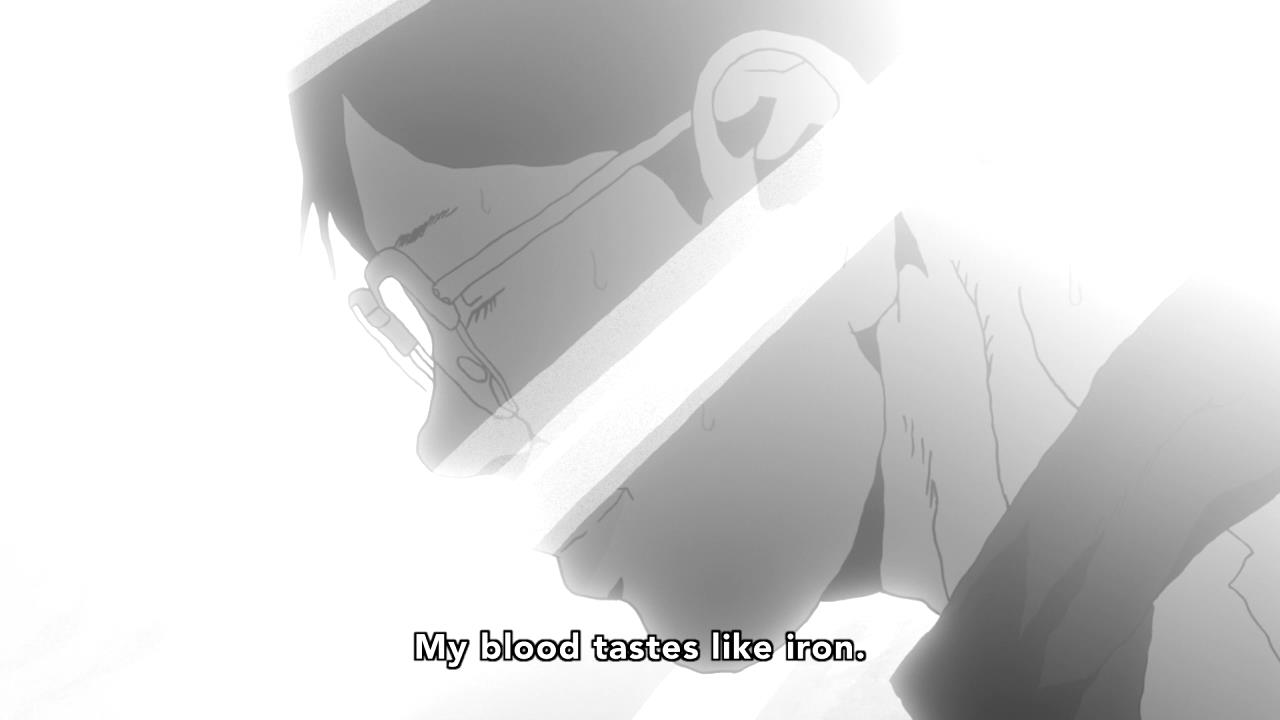“A new age has come, but I still can’t get out of this rut
And it’s too straight and narrow, no escape routes around…”
Tadahitori
“Staking your life on ping pong is revolting,” says Smile, the ostensible “protagonist” of Ping Pong. In the context of a sports show, that seems kind of like sacrilege – what can be more important than giving it your all, than pinning your hopes on the pursuit of a crazy ping pong dream? But in the context of Ping Pong, his words make sense – because Ping Pong isn’t really much of a sports show. The matches are emotive and interpretive, the “training arcs” don’t exist, and instead of characters learning new techniques, we get rambling Christmas song montages. There’s no romance in believing in victory here – in the context of Ping Pong, Smile’s belief in a hero that will save him seems to almost be some kind of ironic joke.
There’s a realism to Ping Pong that could easily be mistaken for cynicism. For all the show is ostensibly about the sport of ping pong, the real world is constantly creeping in. As the wunderkind “hero” Peco boasts of becoming the best in the world, and the seasoned ace Kazama trains for victory at any cost, characters like Peco’s team captain beg off practice because they have to go help at the family store. As the protagonists strive to be the best for all their various reasons, others simply struggle to get by, and the real world is always waiting in the distance. Ping pong may mean the world to some of these characters, but it is not the world, and believing in the supremacy of ping pong talent can only comfort you until you start to fall.
“No paths to choose from, lost for a decision
Alone, I don’t know what I want, lost in wild fancies
I compare myself to others, and fall further and further…”
Failure is a constant refrain in Ping Pong. It’s inevitable, really – the show closely follows five very different competitors, and clearly not all of them can be victorious. Ping Pong is full of harsh, crippling defeats, defeats that shake the foundations of who its characters thought they were. Wenge, the Chinese player who finds himself shipped off to Japan, clings to ping pong as a way home – but when he is defeated, he is forced to reckon with the fact that Japan may now be his home. Sakuma, Peco’s one-sided childhood rival, hopes his hard work will eventually overcome the effortless talent of his peers – but defeat at Smile’s hands forces him to realize that sometimes you just don’t have the aptitude to achieve your dreams. Characters fall and fall hard in Ping Pong, and the show is permeated by both the fear and consequences of failure.
But for all that, Ping Pong is not a cynical show – in fact, it’s about as far from cynical as it could possibly be. It is realistic, yes – but it also deeply optimistic, and has tremendous empathy for its characters. It may not believe in achieving your dreams, yes. But goddamn if it doesn’t believe in people.
“I’m the only one in the world, always the only one in the world
But I’m still gonna do this, you know?”
Ping Pong doesn’t show its characters failing because that’s just the way it goes. It shows them failing because they need to fail – because it is through failure that we grow, and through discarding our immediate pride that we can learn who we truly are. Characters like Wenge, Sakuma, and Peco all suffer terrible defeats in Ping Pong, but those defeats make them stronger. And not simply “ping pong stronger” – Sakuma realizes his path is not ping pong, and Wenge ends up finding pride as a mentor to his teammates. Failure in ping pong is not the end of the world – in fact, it can actually be a window to a more honest engagement with it.
“Honest engagement” is a key refrain in Ping Pong. At the beginning of the show, its characters stand apart – sizing each other up, judging each others’ talents, they see each other not as people to be engaged with, but obstacles to be overcome. But as its various characters begin to fail, and subsequently discard their fear of failure, they come to rely on each other, and on those around them. As absolute belief in victory becomes less and less realistic, Smile’s steadfast belief in a hero strangely becomes that much less absurd. And by the end of the show, even the deeply fear-driven Kazama can see what Smile sees in Peco.
“Maybe there’s no job I’m the only man for, but
Will I fade away without doing anything?
Will I fade away without doing anything?
Like hell will I fade away without doing anything!”
Peco is the hero of Ping Pong, and he represents all that the show values and believes in. He soars high above the people below not because he is that much greater, but because he does not fear defeat – because he plays for his earnest love of the game, and his earnest love of those he plays with. Though characters like Kazama and Smile are content to remain safe in their own cages, Peco lifts them up with his belief, and they lift him higher in turn. Heroes have no weaknesses not because they are invincible, but because nothing can take their love of what they do from them. Peco plays because it is a pure expression of his engagement with the world, and those who engage with the world are not afraid of defeat.
If you just read Ping Pong’s opening song lyrics out loud, they’d sound panicked, even desperate. The story of a boy who’s got nowhere to go, who is preoccupied with how he’ll be known, who throws himself forward because he has no other choice. But in song, they’re joyous, a celebration – he’s gonna throw himself into space, sure, but he’s gonna have fun with it. Though the image of the bird in flight is dominant in Ping Pong, at the end of the opening song we see what it really represents – Peco leaping into the sky, flying and windmilling and then falling like a shooting star. But it’s clear he’ll get up again, clear he’ll once again take to the sky. You’re not going to “win” at life – victory is not something you can cling to forever, and life is made up of skinned elbows and busted knees and broken teeth. But that’s no excuse to stop trying, and certainly no excuse to stop enjoying yourself. It is not the pursuit of victory that lends us strength, that makes us heroes to each other, that makes life worth living. The proof you’re alive is the taste of blood in your mouth, and you’ll never taste that if you don’t leap out into space. It is not the power to fly that lifts us up – it is the courage to fall.
PS: This post was all storytelling all the time, but Ping Pong is a gorgeous production on all fronts. Feel free to check out my smaller posts about its scene transitions, sound design, visual storytelling, and shot framing.





If a story can get you, of all people, to focus entirely on it over production and such in one of these write-ups, then it has GOT to be well told.
Another brilliant write-up, sir.
Thank you!
“Staking your life on ping pong is revolting” is a somewhat cynical statement. Yes, there’s the underlying message, once the show ends, that you play Ping Pong in order to live, rather than live in order to play Ping Pong – the situation Kazama is in, and the person to whom Smile is delivering this line.
Smile may be trying to free Kazama, but he is also trying to crush him. Just around that time he speaks of how it is terrible to crush someone’s dream – that staking your life on ping pong is so terrible because you’re bound to lose, and then what are you left with? And then he goes forth and absolutely demolished the player he plays against. So hard that said player wanders the world, searching for a new place, a new purpose in life.
Fitting that the finale shows said minor character completing a full circle, and finding ping pong is still a large part of his life, as a spectator. He left home, only to come back to it.
Kazama’s fear in particular is interesting. He fears winning, but he cannot stop winning. He truly is the caged one, who sees no way out, and needs help. I’m not sure the same is true for modern Smile, who creates himself as an obstacle, to free Peco from his insecurities, insecurities manifesting in the childish desire to win rather than play ping pong for its own sake.
Smile is caged in his loneliness, and he is the one who manifests the spirit of ping pong. Smile frees Peco, so Peco could free him.
And yes. It’s hard to play a 1v1 competitive game with the expectation that you will never lose. “Defeat is Death” said Kazama, and there had been numerous times when the show had sequences straight out of a samurai manga or film, or a western, where defeat is death. Ping Pong should be fun, and there is life after (death)defeat, which is the lesson Smile tries to teach Kazama cruelly, and which Peco eventually teaches him joyously, once Sakuma teaches him that emphatically.
Growth is a group activity, and even in a two-player game, your peer is your ally in said journey, let alone your team. That’s another thing the show was big on – team. Fear of defeat is a lonely thing, which allies can help salve over.
And shit, I got a mini-write-up here :3
https://twitter.com/B0bduh/status/479703570175258625
https://twitter.com/B0bduh/status/479703589775233025
This whole thing reads like an extended version of these tweets. Great stuff, as always.
Dang, you’re right. I hadn’t even been thinking about Ping Pong at the time…
Ping Pong is great because absolutely everything in it contriutes to its theme.
You often speak about what the anime medium can do and Ping Pong is another perfect example.
It understand so much thing about its characters, and about life in general.
…I can’t really talk about it without praising it endlessly.
Well, another great write up.
All those episode write up really enhanced the experience for me.
Thank you.
You’re welcome! And you’re right, Ping Pong was about as focused as a show could possibly be. Every element contributed to its central points, every episode built towards these wonderful final matches. Now I just want to watch it again.
I know the feeling.
After reading your Final episode posts, I felt like I had to watch it again.
Now, I feel like I should rewatch it entirely.
“It is the courage to fall”
Is it a bad thing that I read this as Hachikuji saying it? Anyway great piece, I almost feel it’s harder to write about this show because it already says everything so well itself. I’m gonna miss having a gem such as this to watch each week. I don’t expect to enjoy anything in the summer quite as much, so I guess I gotta wait for Psycho-Pass 2 now.
I am comfortable with all of my essays being read in Hachikuji’s voice.
The anime was much better than the manga. I read the manga ahead of time, and while it was good, it wasn’t nearly as good as this anime was. Right now, I’m thinking it’s because the anime added in and revised a lot of the original medium; that is, the manga was missing a lot of pages that it needed to help drive its messages home. The anime does a much better job, what with swapping between the scenes of Kazama’s past, to the game, to extensions of Simile vs Peco’s game, etc.
In the manga, the ending to the series felt somewhat… lackluster. But the potrayal in the anime made it seem so much more glorious. In a normal way.
This anime was fantastic, and adapted what was a pretty decent manga into a superb animation.
But speaking of “decent” pieces of work (which I refer to as “works that successful entertain their audiance”), I do want to ask if you actually read any light novels (as opposed to watching their anime adaptions)?
I have a rant about light novels, but it’s 3 AM where I’m at, so tell me if you’re interested in hearing it.
It’s so nice when an adaptation elevates the source material, and all the choices I’ve heard about for this one seemed absolutely brilliant. Kind of ridiculous to think Yuasa can understand the creator’s intent well enough to actually improve on his execution of the central concepts.
Another great writeup for a deserving series. There’s so much to say about the show that it’s not worth talking about it in some comment here, but I’d like to point out that since I started reading your blog last summer your use of images to elevate your writing has improved greatly (currently watching Shiki so no comments on that one, but I seem to remember you saying there were a lot). Your love of music is showing too – it’s hard to mistake your enthusiasm when you include lyrics of relevant songs throughout. I was happy to see you discuss the OP even for a single paragraph because when you are able to have such a direct conversation between two things enjoyed – the show and its OP here – your excitement comes across in a natural way that directly translates into getting me excited to read your piece. It really did deserve the discussion though; I can’t think of an equally perfect OP as Ping Pong’s besides maybe Mushishi’s Sore Feet Song.
Okay I guess I lied and will leave a comment on the show. I think my favorite callback comes from the first episode, though callback may be the wrong word. Maybe motif? Probably should have paid more attention in my literature classes. The scene on the train when Smile says “the one after next” is relevant to just about everything the show discusses. Smile waits for his hero to make it to him at the finals – the match after Peco’s “awakening” vs Kazama. Kong fights to make it to his next match – to find a home for him and his mother. The whole show is really about what comes after what you are doing now. All of the players have to evaluate why they are at the table to begin with and what their next match entails – whether it is more ping pong or otherwise. Making it to the next match is much less difficult when you are passionate about what you are doing. Peco’s love for ping pong is exactly what allows him to get to his next match and consummate Smile’s love of him as a hero as well as Peco’s love for ping pong. I love it. Everything about this show. There’s not much else to say.
Christ, maybe i should start my own blog! Anyways, this is my first Yuasa show and I’m on board for everything of his, epecially after what I’ve heard about his potential studio deal. This one I have no problems calling a masterpiece.
Yeah, “the one after next” really was a perfect line to end that first episode on, and a perfect summation of the show. There’s always something else waiting for you, and Ping Pong is determined to demonstrate that that is a great thing, not something to be feared.
Glad to hear my posts are improving! Thank you for saying so.
Great write-up as always. The entire show made me think of this.
http://zenpencils.com/comic/theodore-roosevelt-the-man-in-the-arena
“Ping Pong doesn’t show its characters failing because that’s just the way it goes. It shows them failing because they need to fail – because it is through failure that we grow, and through discarding our immediate pride that we can learn who we truly are.”
Not to get too personal, but I’ve been struggling with the above for the past few years and this hit right home. I’ve got a better outlook on life now, but Ping Pong was such a bittersweet ride all the way through. And Kong, KONG, every time he popped up on-screen I was almost in tears.
coughs
Anyway, great write-up, I’ve been waiting for this one!
KONG. HOLD ME.
Glad you enjoyed the post!
Very good read… deepens my appreciation of the show, a show which I already really love before coming across your piece.
It’s such a human story, this anime, and it made good use of Peco as this inspiring figure that had to be inspired in turn before turning into the hero that he would become.
There’s so much love here, albeit such manly and perhaps male-exclusive love. I’m male so I don’t mind.
The cleverness of this show is how it kept itself somehow grounded in the sport by fleshing out so many technical aspects (style, grip, technique, equipment) that the gross departures from reality is easy to forgive. The animation of some full rallies helped as well.
Kong Wenge is my favorite though. I never saw that coming.
It also grounds those matches in emotional truths – the stakes and tensions of the “battles” are always clear in both character arc and immediate, visceral emotional terms, meaning it doesn’t really have to be comprehensible as immediate sports drama. Which is generally my preference, actually, so it’s not surprising I loved those sequences.
I’m almost scared to say this, as the sentiment about this show is so overwhelmingly positive, but I have an almost compulsive need to provide a small dissenting voice here.
While I certainly didn’t dislike Ping Pong, I struggle to understand how so many could find it so fulfilling when it just left me stone-cold. I felt the storytelling and plot were overly deterministic, and as a result, the whole show just came across as a kind of chilly, intellectually distant presentation that I could never connect to viscerally. Unlike seemingly everyone else, I found the characterizations to be sketchy and rather stereotypical, and the whole structure of the tale seemed to be more hellbent on proving itself an “anti-sports” sports show than it was seeking to tell an emotionally rewarding story.
Honestly, I’m glad that so many found it to be such a wonderful and engaging tale, it’s just that I’m personally kind of befuddled as to why that’s so!
I don’t really see this as a flaw – most great stories have an extremely defined structure, and don’t really need left-field surprises to promote engagement. I think Madoka is the same way, for example. I think great storytelling is about how you say what you want to say.
I guess we just disagree, then? I mean, you’ve seen my writeups – I talk about where these characters began, what passions/fears define them, how their interactions with others change them, where they end up. If they don’t connect with you, that’s fair, but personally I think the characterization was pretty flawless.
I feel like Ping Pong basically demonstrates why many sports shows aren’t emotionally rewarding – because they feel disconnected from the world. I see a grounded humanism in Ping Pong that I don’t really get out of many other shows.
Pingback: Spring 2014 – Week 12 in Review | Wrong Every Time
A great analysis of the central theme of Ping Pong..For me the whole thing was given emphasis by the story of that curly haired guy who lost to Smile in the first tournament.He suffered from depression,wandered from place to place ,went abroad only to finally realise that even though he had lost..that didn’t mean that his love for ping pong was false.In that way his was a different and more realistic portrayal from Peco’s,whose innate talent pushes him through.The anime shows us different events and their effects on a variety of characters..but it was that guy’s story that really affected me the most.
(P.S.maybe I’m nitpicking here..but why should coming second in the nationals mean doom for your career..both Smile and his coach had the talent to progress far irrespective of their losses yet they both seem to just give up,I mean even if you don’t get to reach the top ,ping pong is still an option for mid to high card players as a career.)
Awsome article.I can’t believe that someone can develope that ideas from the game of ping pong.